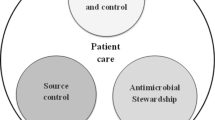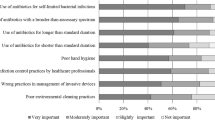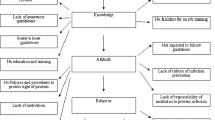Abstract
Methicillin-resistant Staphyloccocus aureus (MRSA) infection has received much attention in both the medical and non-medical press. However, it is not widely encountered on ENT wards, given the profile of short-stay, relatively well patients, although its impact seems to be increasing. We wished to explore the knowledge and attitudes towards MRSA on general surgical and ENT wards, and see if there were any significant differences between specialties, or between doctors and nurses. A 13-item questionnaire with a Likert scale response with six knowledge questions and seven attitude questions was prepared. It was completed anonymously by all nursing and medical staffs on the ENT and general surgical wards of a large District General Hospital. ENT doctors displayed the lowest knowledge and attitude scores; however, this only attained significance in terms of the knowledge of the difference between infection and colonization. Overall, nurses displayed significantly more positive attitudes towards MRSA patients than doctors, but knowledge scores were not significantly different between professions. The study suggests a lack of knowledge about and preponderance of negative attitudes towards MRSA amongst ENT doctors. The difference between colonization and infection is not well understood. Reasons for this may include the relative rarity of MRSA cases on ENT wards.



Similar content being viewed by others
References
Reacher MH, Shah A, Livermore DM et al (2000) Bacteraemia and antibiotic resistance of its pathogens reported in England and Wales between 1990 and 1998: trend analysis. Br Med J 320(7229):213–216
Baird D (2006) New UK MRSA guidance: what happens next? Comparison of the UK MRSA guidelines with recent guidance from Scotland. J Hosp Infect 64(4):336–338
Pujol M, Pena C, Pallares R, Ayats J, Ariza J, Gudiol F (1994) Risk factors for nosocomial bacteremia due to methicillin-resistant Staphylococcus aureus. Eur J Clin Microbiol Infect Dis 13(1):96–102
Wenzel RP, Perl TM (1995) The significance of nasal carriage of Staphylococcus aureus and the incidence of post-operative wound infection. J Hosp Infect 31:13–24
Sharma A, Philpott C, Pope L, McKiernan D (2006) Methicillin resistant Staphylococcus aureus: is it a problem for nasal surgery? J Laryngol Otol 11:1–4
Parton M, Beasley NJ, Harvey G, Houghton D, Jones AS (1997) Four cases of aggressive MRSA wound infection following head and neck surgery. J Laryngol Otol 111(9):874–876
Watters K, O’dwyer TP, Rowley H (2004) Cost and morbidity of MRSA in head and neck cancer patients: what are the consequences? J Laryngol Otol 118(9):694–699
Nixon IJ, Bingham BJ (2006) The impact of methicillin-resistant Staphylococcus aureus on ENT practice. J Laryngol Otol 120(9):713–717
Safdar N, Marx J, Meyer NA, Maki DG (2006) Effectiveness of preemptive barrier precautions in controlling nosocomial colonization and infection by methicillin-resistant Staphylococcus aureus in a burn unit. Am J Infect Control 34(8):476–483
Boyce JM (2001) MRSA patients: proven methods to treat colonization and infection. J Hosp Infect 48(Suppl A):S9–S14
Loveday HP, Pellowe CM, Jones SR, Pratt RJ (2006) A systematic review of the evidence for interventions for the prevention and control of meticillin-resistant Staphylococcus aureus (1996–2004): report to the Joint MRSA Working Party (Subgroup A). J Hosp Infect 63(Suppl 1):S45–S70
Fairclough SJ (2006) Why tackling MRSA needs a comprehensive approach. Br J Nurs 15(2):72–75
Afif W, Huor P, Brassard P, Loo VG (2002) Compliance with methicillin-resistant Staphylococcus aureus precautions in a teaching hospital. Am J Infect Control 30(7):430–433
Beaumont W (2003) Shocked by attitude to MRSA. Br Med J 326:1328
Hamour SM, O’Bichere A, Peters JL, McDonald PJ (2003) Patient perceptions of MRSA. Ann R Coll Surg Engl 85(2):123–125
Newton JT, Constable D, Senior V (2001) Patients’ perceptions of methicillin-resistant Staphylococcus aureus and source isolation: a qualitative analysis of source-isolated patients. J Hosp Infect 48(4):275–280
Lines L (2006) A study of senior staff nurses’ perceptions about MRSA. Nurs Times 102(15):32–35
Afif W, Huor P, Brassard P, Loo VG (2002) Compliance with methicillin-resistant Staphylococcus aureus precautions in a teaching hospital. Am J Infect Control 30(7):430–433
Seaton RA, Montazeri AH (2006) Medical staff knowledge about MRSA colonization and infection in acute hospitals. J Hosp Infect 64(3):297–299
Gill J, Kumar R, Todd J, Wiskin C (2006) Methicillin-resistant Staphylococcus aureus: awareness and perceptions. J Hosp Infect 62(3):333–337
Author information
Authors and Affiliations
Corresponding author
Appendix: Questionnaire
Appendix: Questionnaire
We are interested in your responses to the following questions about MRSA. Please answer all questions by circling a number from 1 to 5 depending on your level of agreement with the statement. Your answers are confidential.
Job Title_____________________________________
Agree | Disagree | ||||
|---|---|---|---|---|---|
Colonization and infection with MRSA are basically the same thing | 1 | 2 | 3 | 4 | 5 |
People colonized with MRSA are a danger to everyone they come into contact with | 1 | 2 | 3 | 4 | 5 |
A post-operative patient with an open wound infected with MRSA is a burden to hospital staff caring for them | 1 | 2 | 3 | 4 | 5 |
Patients colonized with MRSA probably have poor personal hygiene | 1 | 2 | 3 | 4 | 5 |
A patient with an MRSA infected wound should be nursed in a side ward | 1 | 2 | 3 | 4 | 5 |
Hospital staff should spend as little time as possible with patients with MRSA infection | 1 | 2 | 3 | 4 | 5 |
Hand washing is one of the best ways to control the spread of MRSA | 1 | 2 | 3 | 4 | 5 |
A patient with an MRSA infected wound does not make my job any more difficult | 1 | 2 | 3 | 4 | 5 |
Patients infected with MRSA should receive the basic medical care they need, but not additional services such as physiotherapy | 1 | 2 | 3 | 4 | 5 |
One patient in my care with an MRSA infected wound takes up more of my time to the detriment of my other patients | 1 | 2 | 3 | 4 | 5 |
3 negative MRSA screens are needed before a patient with an MRSA infection can return to an open ward | 1 | 2 | 3 | 4 | 5 |
A patient being cared for in a side room due to MRSA infection should be allowed to use the bath/shower on the ward | 1 | 2 | 3 | 4 | 5 |
A patient with an MRSA infected wound should not be allowed visitors | 1 | 2 | 3 | 4 | 5 |
Rights and permissions
About this article
Cite this article
Phillips, P.S., Golagani, A.K., Malik, A. et al. A staff questionnaire study of MRSA infection on ENT and general surgical wards. Eur Arch Otorhinolaryngol 267, 1455–1459 (2010). https://doi.org/10.1007/s00405-010-1221-3
Received:
Accepted:
Published:
Issue Date:
DOI: https://doi.org/10.1007/s00405-010-1221-3




